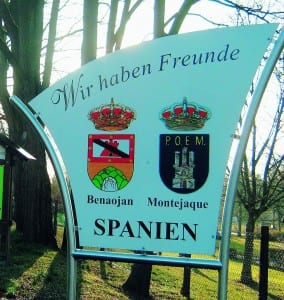By Andrew Pearce and Paul Whitelock
IT was an opportunity that even the insular General Franco could not turn down.
Despite over two decades since the end of the Civil War, much of Spain was still in an economic mess.
And the Republican stronghold of Andalucia – largely ignored by the Spanish dictator – was facing ruin.
Yet a ray of light arrived from the most unlikely of places which was to change the lives and fortunes of thousands of Andalucians.
Little more than ten years since the end of the Second World War, a once broken Germany was experiencing its own economic miracle.
It was quickly rebuilding its economy and handed Franco the chance to reverse the ailing fortunes of his country.
Jobs in industry were fast being created and Germany’s government was offering ‘Gastarbeiterprogramm’ Guest Worker Programs in heavy steel industry.
Free, functional accommodation was often the selling point for the thousands of Andalucians who had been forced to live in squalor in the years after the Spanish conflict.
Italy had already signed up to send over workers in 1955 and Spain struck its own deal on March 29, 1960.
“Many Andalucians were in desperate need of work and Franco made a point of sending them over first as they were illiterate and of less value to the Spanish economy,” explains German author Erica Ruetz, who has been researching a TV documentary about the Germany-bound emigration of Andalucians.
The majority initially headed to Baden-Wuerttemberg and the industries of the Neckar valley around Stuttgart.
From the Serrania de Ronda alone some 8,000 people headed north, with the villages of Montejaque, Benaojan, El Gastor and Igualeja being the biggest providers of workers.
And, as the floodgates opened, many Andalucians also opted for Switzerland and France as the opportunities for work grew.
But it was in Germany where many established long-term ties with the towns and people.
So special were the bonds that were eventually formed between the work-hungry Spaniards and the welcoming Germans, that a partnership was announced between two Andalucian mountain villages and a German town.

The Olive Press revealed last month that Benaojan and Montejaque – two white villages near Ronda – put the official seal on the 50-year relationship with the town of Knittlingen, where about 300 Andalucians settled.
And it was not just the booming German towns that saw the opportunity to benefit from these eager Andalucians.
Incredibly, a taxi service was created that drove people from Montejaque to their new work base in Knittlingen.
Manolo was the hardy soul who regularly embarked on the journey up through Spain to the German climes.
“Over 30 years ago I regularly drove villagers – many of them were close friends of mine – up to Germany,” he remembers.
“Back then, I’m sure you can imagine, the roads were nowhere near as developed as they are now.
“It could be a hair-raising journey at times, especially along Andalucia’s mountain roads but I would get about 18,000 pesetas for a day’s drive – about 100 euros in today’s rates.”

Despite having to start a new life so far away from the idyllic villages they grew up in, the Andalucians were determined not to use homesickness as an excuse not to go.
“Although the Germans have a reputation for being work horses, I can tell you that the Spanish immigrants often worked harder than their counterparts,” explains Ruetz.
And it was through their spirited, determined attitudes that the Andalucians won the respect of their colleagues.
“The Spanish melted into German society without a trace and never created any unrest or tension,” continues Ruetz.
“There have notoriously been many problems between the Germans and the Turks but, in spite of my extensive research, I have been unable to uncover any sources or people documenting trouble between Spaniards and Germans.”
One reason for this was undoubtedly the very fact that the Spaniards were overcome by relief with the new lives they encountered in Germany.
The companies such as Keumo and Kiesselmann offered the migrants free, new flats – a commodity of which dreams were made of back in Andalucia.
“It was a paradise, water came out of the wall,” explains Miguel Ruiz, from Benaojan.
What’s more, although wages were certainly not bountiful, the Spaniards undoubtedly earned more they ever would have back in Andalucia.
But this flourishing quality of life far away from the Spanish motherland was still able to be tempered by the autocratic Franco.
He sent priests and teachers to the Spanish districts to ensure his people adhered to their home values and remained true to Spain.
More likely, it was a case of “remaining Catholic and keeping their mouths shut” according to Ruetz.
However, the dictator could not complain about the efforts his disbanded Spanish workers were putting in.
It is estimated that between 1960 and 1970, the overseas workers contributed some five per cent to Spain’s GDP, purely through the money that was sent back to family.
Originally harbouring hopes to work for a number of years and wait for the economic situation in Spain to pick up before returning home, many Spaniards soon realised that they had become extremely settled in northern Europe.
“Many of them wanted to make enough money to allow them to come back, buy a home in Spain and live happily back in their villages,” explains Ruetz.
“But the problem is their children went to school, integrated so well and basically became Germans themselves.
“Now, many of the original arrivals are recognised as highly-skilled workers and earn more than teachers.”
Overcoming their stereotype that Spaniards are not the world’s greatest at learning languages, many quickly picked up their new mother tongue.
‘It was a paradise, water came out of the wall,’ explains Miguel Ruiz
However, one, Maria Lopez, in Knittlingen, despite having lived in Germany for almost 30 years was still unable to string a sentence together.
But she managed to get by. For example, a trip to the butchers would involve lots of ‘oinking’ if pork was on the day’s menu!
As the Germans became increasingly friendly with their Spanish friends they would often hear the names of their former village homes, such as Benaojan and Montejaque, crop up in conversation.
The migrant workers would speak about their old lives and the paradise, mountain outposts in glowing terms – fuelling their hosts’ desire to visit these mystical heavens.

For instance, Rita Kohler, 59, a former nurse, proved that not all migration was Germany bound.
“I was living and working in a Knittlingen clinic and I could never get away from co-workers and patients talking lovingly about their home pueblo,” explains Kohler.
“In 2003 I decided to take a holiday there and fell in love with the area.
“So much so that on the second day we bought a house where I now live!”
Indeed, Kohler’s case is not alone as there are quite a few Germans who settled in the mountain towns.
And it was during these trips to the hillside hideaways where Germans – paradoxically just like the migrant Spaniards – stumbled upon their dream settlements.
The life of Charlie Smidt, once a workaholic in southern Germany, was transformed after choosing to settle in Spain.
“I learnt how to work in Germany, but in Montejaque, I learnt how to live,” he says.
The Germans after all really do have a lot to thank the Spanish for too.
Click here to read more News from The Olive Press.







“I learnt how to work in Germany, but in Montejaque, I learnt how to live”
Well, Spain is certainly the place to come to if you want to become like a native i.e. work the minimum hours possible and laze about all day doing sod all. lol.
Oh, Fred. I feel really sorry for you – you’re so miserable and so negative!
I’ve said before: ” Why don’t you f**k off somewhere else?” You clearly don’t belong here.
All my friends and acquaintances are delighted to have the good fortune to live here. True, a lot of the bureaucracy is infuriating, but hey, the rest is only good!
My dear old friend Pablo, negativity does not imply inaccuracy. It is not just bureaucracy that is the problem in Spain; it is also a very unjust country. The weather and people are very nice, but they are lazy buggers, and you know it.
You should read your own website a bit more; it’s full of rants and moans about Spain. I may yet join up.
Fred, always Fred,
Unlike labour week in France is framed in 35 hours, we sign 40 per week and work 50 indeed. Why don´t you wake up early one day and realise what people are doing entering at the industrial state at 9 in the morning and going back since 8 to 9 in the evening. Deduct two hours for lunch and you’ll get it. From Montejaque you are quite next to Ronda. Unjust is criticizing once more what you don´t know from your golden retirement.
Yes, I am myself – thanks Juan. The reality of ‘work’ in the Spain I have lived in, worked in and experienced day-tp-day is one of 2nd breakfasts, three hour lunchbreaks, unanswered phones and utterly pathetic service when someone eventually does spring to life.
As for my golden retirement, I am actually only halfway to it and I work fulltime in Spain. Spain’s economic problems are certainly related to its awful working practices and procedures. Only my opinion of my experiences Juan, but I see it repeated time and time again by other people.
It´s a great article… one of the best features we have had for a while…but Im going to largely back fred´s comments from my own personal experience down here in the backwaters of andalucia (second breakfasts, long lunches, bad service culture, etc), although there are many wonderful exceptions, which Pablo touches on.
I just wish old Fred used some tact and the occasional bit of positivity to balance things up every once in a while. After all, he says he is in full time employment, which certainly makes me wonder how he has so much time to fire off so many angry (albeit amusing) missives…
what do you say, dear boy?
anything nice?
Well said, Ed. Fred can be entertaining, but his constant griping with no good things to say about Espana does get a bit wearing!
As for the 2nd breakfasts, long lunches, etc, you just work round all that. In a way it’s one of the attractions of the place. It’s pretty stress-free I’d say, compared to my previous life in the UK. Why is life expectancy in Spain higher than anywhere else in Europe? (I think I read that in the OP a while back).
I have said good things about Spain. It’s people are very nice and the (inland) country is beautiful and diverse.
Pablo’s “stress free” analogy is personal to him; the reality is quite different for most expats I’d say, especially expats who work in Spain or who are trying to run a business – the ones that I know and work with would agree with me every time. The only expats who are not stressed out are those retirees on big pensions who can swallow the exchange rate fluctuations, and highly skilled individuals who have high demand for their services. All the rest are barely surviving and are contemplating a return to their home countries. Spain has never had so few immigrants – even the poor ones have left lol.
Interesting this article is about Germany. I have Spanish friends who are moving themselves and their three children to Germany in 2011, and with the full support of their family. Who can blame them? They tell me that they are sick and tired of being in and out of work for years on end and just want to live in a country that has prospects and “that just works” – their quote. I can really emphasise with that.
Sorry I’m wearing on you Pablo. Perhaps you need a nice holiday? The UK is lovely this time of year.
I’m actually going on holiday on Thursday for a month – to Germany!
When I get back I’ll let you and your friends know the reality of life in Germany post re-unification and in the grip of the current recession. It’s not as jolly as you/they seem to think.
Believe me Pablo, at the moment life for most people in post-reunification Germany is a lot jollier than it is for most people in Spain.
Justin, we’ll have to agree to disagree, I’m afraid. I travel regularly to Germany and all the people I know are struggling with the effects of the current recession coming hard on the heels of a mis-managed re-unification.
The Spanish who emigrated to Germany years ago are now finding that the euros they earn in Germany no longer go as far as the Deutschmarks of yesteryear.
For me, and I lived in Spain I had to leave after one year. That was not good for Spain as I had and still have two young boys but trying to get anything done via the local snail like corrupt town hall meant I had to go.
I have to agree with Fred, but I have to say the builders I used who were self employed and had a good reason to work hard were excellent. I have a lot of land at one place and some free water, I have a pool and so on so life is good in Spain if you can just be a vegetable because if you want or need to do anything, make a living etc then there are plenty of people to stop you. Time is money.
I was out on a meeting today with a new to be customer and a couple of work colleagues. Holidays is a subject that comes around and they asked were I was going. Spain came up and then they said, so your property is not getting knocked down? Not at the moment I replied. Every English person knows about Spain and the problems. Thing is not many houses have been knocked down as of yet. The Priors house has cost them €100’s millions.
If you are happy with being a vegetable or do not need any work doing and you have a good pension you are OK (unless you house is about to be knocked down). Don’t bother otherwise. Most commuters you meet on the plane on a Friday afternoon laugh at the suggestion of working in Spain. It is for holidays or relaxing only.
Could be a good place but can’t see that changing. It is not in the world cup finals for business, it is in the 3rd division.
I probably don’t travel to Germany as often as you do Pablo, but I did live there and I stay in touch with many of my German friends, who in spite of having to tighten their belts, and some of them work longer and for less are all still employed. Hardly any of my Spanish friends are employed, and it constantly amazes me how they get by. The best they can hope for is a bit of work in a chiriguito over the summer. I know where I would rather live and I stand by my assertion that life for most Germans is a lot jollier than life for most Spaniards…
You must know different Germans and Spaniards to me. Not clear where you’d rather live, though – Spain or Germany.
Enjoyed your piece to camera on BBC Breakfast last week!
This entire eMail-conversation about the work-ethos of Spaniards vs Germans is apparently based on private views rather than facts. Facts: 7,1% unemployed in Germany, 19% in Spain.
The reason for this has nothing to do with lazyness on the Spanish side or the alleged workmanship of the Germans: It is education and politics. 30% of the Spanish unemployed under 30yrs have no secondary school exams and no professional training. Most of the presently unemployed in Spain have worked on a time-contract-basis; much easier to sack than people with long-term contracts that are usual in Germany. (And make German production-costs rather expensive.)
So the question is not where you would rather live, gentlemen. People usually like to live where they can make a living.